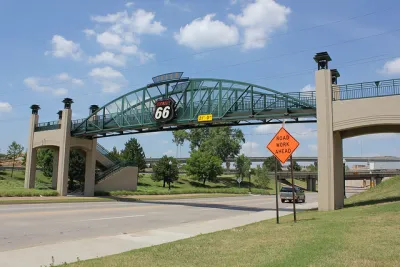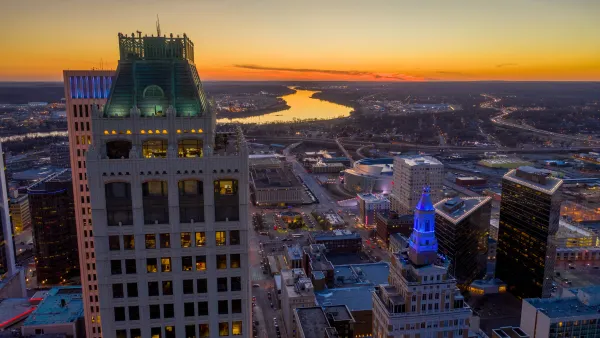Smaller cities are luring newly untethered workers with cash incentives, bikes, and other local perks.

As more Americans shift to remote work, towns and states are seizing the opportunity to attract new residents, writes Patrick Sisson. Regions like Tucson and Northwest Arkansas have developed "marketing campaigns aimed at convincing young, hungry talent to take a gamble on a new place alongside a less romantic reason to explore a new city: cold, hard cash."
By offering financial incentives to defray moving costs, cities are grabbing the attention of the new "Zoom commuter workforce." Incentive programs vary, with cities and states offering a combination of cash and "other amenities, such as co-working memberships, homeownership programs, and meetups to help new arrivals get rooted in the community." Northwest Arkansas' Life Works Here initiative "provides $10,000 and a mountain bike, a nod to the area’s famous trail network."
"This is the 'revenge of the small city,' says Liz Pocock, who oversees Remote Tucson, the Arizona city’s nascent incentive program that launched in November. In an era when talent has finally been uncoupled from an office, the economic competition between cities isn’t just about marquee companies and their headquarters, she says. Now it’s about quality of life and natural amenities."
The concept of paying people to move began as a curious aberration in 2019, but gained steam as the pandemic suddenly untethered millions of workers. Now, it appears that "[t]hese quirky experiments may just be the future of economic development." However, some economic development experts warn that the programs could become unsustainable, making it "harder to lure new residents — or more expensive as everyone simply chases the highest incentive." Critics also point out that, without further investment in local education and infrastructure, moving incentives "ultimately move talent around and don’t develop it in their backyards."
FULL STORY: Why So Many Cities Are Now Paying Workers $10,000 to Relocate

Analysis: Cybertruck Fatality Rate Far Exceeds That of Ford Pinto
The Tesla Cybertruck was recalled seven times last year.

National Parks Layoffs Will Cause Communities to Lose Billions
Thousands of essential park workers were laid off this week, just before the busy spring break season.

Retro-silient?: America’s First “Eco-burb,” The Woodlands Turns 50
A master-planned community north of Houston offers lessons on green infrastructure and resilient design, but falls short of its founder’s lofty affordability and walkability goals.

Test News Post 1
This is a summary

Analysis: Cybertruck Fatality Rate Far Exceeds That of Ford Pinto
The Tesla Cybertruck was recalled seven times last year.

Test News Headline 46
Test for the image on the front page.
Urban Design for Planners 1: Software Tools
This six-course series explores essential urban design concepts using open source software and equips planners with the tools they need to participate fully in the urban design process.
Planning for Universal Design
Learn the tools for implementing Universal Design in planning regulations.
EMC Planning Group, Inc.
Planetizen
Planetizen
Mpact (formerly Rail~Volution)
Great Falls Development Authority, Inc.
HUDs Office of Policy Development and Research
NYU Wagner Graduate School of Public Service




























